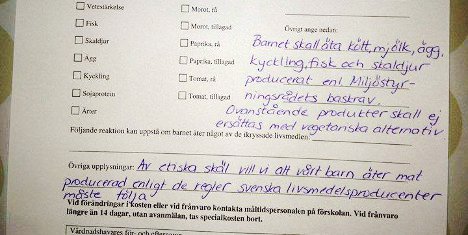EU yields power to school-lunch activists

The European parliament has passed new public procurement rules that will allow Swedish authorities to demand more from its suppliers, which could please local movements for better school meals.
The EU has spent the past two years looking at ways to modernize its public procurement rules, partly to allow smaller and medium-sized business to compete with bigger enterprises. Across the union, member states spend an average of 18 percent of GDP on buying services and goods.
"Directives must move with the times," European Commissioner for the Internal Market Michel Barnier commented at the time.
The final version cleared a European parliament vote on Wednesday, which will give Swedish local authorities more freedom to shop around as they see fit. A series of grass-roots revolts against procurement procedures have already popped up across Sweden, especially in relation to parents worried about their children's meals at school.
"I'm tired of them procuring without placing demands and only focusing on getting the cheapest deal possible," milk farmer and parent Britta Mattsson told the Upsala Nya Tidning (UNT) newspaper in October after she told her children's school their dietary requirement was to eat food produced according to domestic recommendations.
She referred her children's school to the guidelines published by SEMCo (Miljöstyrningsrådet), the government's expert body on environmental and sustainable procurement.
A dummy demand letter, to be sent to the local authorities, was posted on Facebook to show other parents how they can ask for school meals to be produced in accordance with Swedish standards.

"I want my children to get the best food available. For example, they should not have to eat meat that could contain traces of antibiotics," Mattsson told UNT about her work to influence procurement in the eastern Swedish town of Östhammar.
Further south, in Lidingö, near Stockholm, a group of parents incensed at the bare-boned ingredient labels available on food served to their children spoke up when the time came to choose the school's next meal provider. They had felt their concerns and wishes were ignored by the school principal. The parent's first objective was to rid school meals of additives.
As EU parliamentarians readied to vote on the new directive on Wednesday, Swedish MEP Jens Nilsson said the new directive would bestow more freedom in the tender process.
"What's been bothering Swedish municipal politicians for fifteen years will today become much easier," he told the TT news agency. "You could say that power has been shifted to the procurer."
The Social Democrat politician said that public authorities could now take into account not only environmental factors when buying goods and services, but look at whether production respected collective bargaining deals and other labour market issues.
A former regional politician with experience from the procurement process, Nilsson said that Swedish lawyers had often over-interpreted the old EU procurement laws and unnecessarily shackled local leaders in their attempts to add demands to the tender process.
"What I experienced as a municipal politician was that the lawyers would all say the same thing: "Stop now, you can't write the specification that way, the EU doesn't allow it'," he recalled. "And then it turned out you could write specifications with those kind of demands in Denmark and in Italy, but not in Sweden."
He accused the Swedish Competition Authority (Konkurrensverket), the country's anti-trust agency, of "not being fair".
"They've blamed stuff on the EU that has actually been homemade (policy)," Nilsson said.
At SEMco, meanwhile, the government has identified more demanding public procurement as a potential money spinner for Sweden.
"(Green public procurement) can stimulate economic development and technical innovation, which may subsequently result in profitable exports in future markets that have high environmental demands," the agency notes on its website.
Comments
See Also
The EU has spent the past two years looking at ways to modernize its public procurement rules, partly to allow smaller and medium-sized business to compete with bigger enterprises. Across the union, member states spend an average of 18 percent of GDP on buying services and goods.
"Directives must move with the times," European Commissioner for the Internal Market Michel Barnier commented at the time.
The final version cleared a European parliament vote on Wednesday, which will give Swedish local authorities more freedom to shop around as they see fit. A series of grass-roots revolts against procurement procedures have already popped up across Sweden, especially in relation to parents worried about their children's meals at school.
"I'm tired of them procuring without placing demands and only focusing on getting the cheapest deal possible," milk farmer and parent Britta Mattsson told the Upsala Nya Tidning (UNT) newspaper in October after she told her children's school their dietary requirement was to eat food produced according to domestic recommendations.
She referred her children's school to the guidelines published by SEMCo (Miljöstyrningsrådet), the government's expert body on environmental and sustainable procurement.
A dummy demand letter, to be sent to the local authorities, was posted on Facebook to show other parents how they can ask for school meals to be produced in accordance with Swedish standards.

"I want my children to get the best food available. For example, they should not have to eat meat that could contain traces of antibiotics," Mattsson told UNT about her work to influence procurement in the eastern Swedish town of Östhammar.
Further south, in Lidingö, near Stockholm, a group of parents incensed at the bare-boned ingredient labels available on food served to their children spoke up when the time came to choose the school's next meal provider. They had felt their concerns and wishes were ignored by the school principal. The parent's first objective was to rid school meals of additives.
As EU parliamentarians readied to vote on the new directive on Wednesday, Swedish MEP Jens Nilsson said the new directive would bestow more freedom in the tender process.
"What's been bothering Swedish municipal politicians for fifteen years will today become much easier," he told the TT news agency. "You could say that power has been shifted to the procurer."
The Social Democrat politician said that public authorities could now take into account not only environmental factors when buying goods and services, but look at whether production respected collective bargaining deals and other labour market issues.
A former regional politician with experience from the procurement process, Nilsson said that Swedish lawyers had often over-interpreted the old EU procurement laws and unnecessarily shackled local leaders in their attempts to add demands to the tender process.
"What I experienced as a municipal politician was that the lawyers would all say the same thing: "Stop now, you can't write the specification that way, the EU doesn't allow it'," he recalled. "And then it turned out you could write specifications with those kind of demands in Denmark and in Italy, but not in Sweden."
He accused the Swedish Competition Authority (Konkurrensverket), the country's anti-trust agency, of "not being fair".
"They've blamed stuff on the EU that has actually been homemade (policy)," Nilsson said.
At SEMco, meanwhile, the government has identified more demanding public procurement as a potential money spinner for Sweden.
"(Green public procurement) can stimulate economic development and technical innovation, which may subsequently result in profitable exports in future markets that have high environmental demands," the agency notes on its website.
Join the conversation in our comments section below. Share your own views and experience and if you have a question or suggestion for our journalists then email us at [email protected].
Please keep comments civil, constructive and on topic – and make sure to read our terms of use before getting involved.
Please log in here to leave a comment.